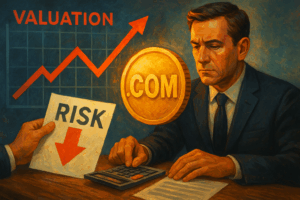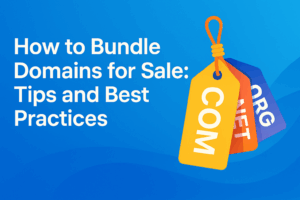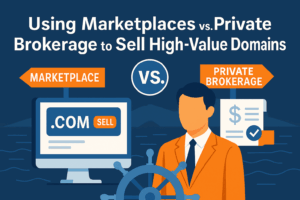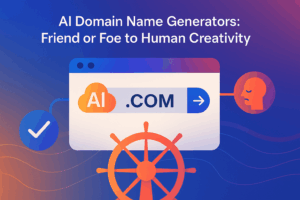Cutting Out the Middleman: Sovereignty and Digital Asset Investments

One of the main selling points associated with domain names is represented by the sovereignty argument, by the fact that by building an online presence or business on a domain you control, you do not have to depend on a middleman who can pull the plug at any point and for whom you are nothing more than an insignificant statistic (yes, you might get lucky and end up a big enough deal to register on their radar to be on the receiving end of special treatment, but this is highly unlikely for the overwhelming majority of players).
The same way, bitcoin (and later on other cryptocurrencies) was enthusiastically adopted by those who were sick and tired of middlemen such as PayPal or banks which could simply cite some random sentence from their novel of a T&C section and close down accounts, with little or even nothing in the way of recourse… for your own protection, of course (to quote one of the most annoying terms used by the entities in question).
The Allure of the Middleman
I need to discuss the domain I own!
Freedom-oriented individuals have always been perplexed as to what on Earth could determine a business to set up shop through a Facebook page rather than their own website or why influencers would go all-in on their Instagram (for example) presence instead of setting up a nice website using their first plus last name and publishing content there.
Unfortunately, the issue is far too complex to be reduced to a simple freedom-related narrative because middlemen have extremely effective ways of luring you in. For example:
- Not having to worry about your website being down or about prohibitive hosting bills, everything is offered to you on a silver platter and in an intuitive plug and play manner
- Receiving traffic from the platform in question, traffic which would have been quite hard or very expensive to come by. If your content is engaging enough, you tap into a behemoth of a traffic pool and best of all, can do so without having to reach for your wallet
- Possible monetization perks, either a cut of whatever it is your platform earns for your content via advertising or platform-specific opportunities but which aren’t provided by the platform itself, for example Instagram sponsorships through which influencers earn a small fortune for reviewing a gadget or taking a photo of themselves wearing a certain piece of clothing
… the list could go on and on.
As such, make no mistake: it would be incredibly short-sighted to assume that the platforms in question offer zero value and are simply preying on innocent, unsuspecting content creators. That is most certainly not the case and on the contrary, the relationship is downright symbiotic when things are going well. Content creators receive free traffic and in some cases even hassle-free money, whereas the platforms have an army of creative individuals who are eager to provide value to their audience.
This Works… Until It Doesn’t
The “until it doesn’t” part can mean anything from a controversial piece of content getting you in trouble to the platform deciding to terminate accounts associated with certain industries altogether, even if you as a content creator never did anything wrong. For example, quite a few cryptocurrency enthusiasts have made a name for themselves on twitter (CT, as in CryptoTwitter) but would it really surprise anyone if the platform would all of a sudden decide to make @jack step aside and onboard someone who is keen on banning anything crypto-related?
To put it differently, middlemen offer an excellent deal in many instances but there is a price to pay: uncertainty. For an extended period of time, a let’s call it “honeymoon period” for social media networks, this uncertainty hasn’t exactly received all that much attention but fast-forward to the ultra-polarized world we live in today and it has become apparent that not being dependent on one middleman or another has its perks in terms of brand staying power.
The Implications for Digital Assets
Before digging in and analyzing the implications of the 2020 status quo as far as digital assets are concerned, it’s vital to point out that we shouldn’t kid ourselves: the average internet user does not care about “grandiose” concepts such as sovereignty, freedom and what not. For the most part, people just want to be spoon-fed content and that’s pretty much it.
The elephant in the room is not represented by the Average Joe but rather by the ambitious few who understand such threats and take action by embracing domain names for brand sovereignty reasons, bitcoin as censorship-resistant money and the list could go on and on. Those who believe change can only materialize if 50% + 1 individuals embrace it couldn’t be more wrong. A vocal and ambitious minority is more than enough to set mega-trends in motion.
As an example unrelated to digital assets, less than 2% of Americans are Jewish, yet over 40% of the packaged food sold in the US is kosher. Why? Simply because Jewish buyers would not have it any other way, whereas the average buyer couldn’t care less and as such, many producers ended up deciding that making their products kosher is the rational thing to do… again, an active minority represents a force to be reckoned with no matter what it is advocating: an ideology, rights or in our case the importance of sovereignty.
Will Changes Appear Overnight?
Most definitely not. It would be childishly optimistic to assume that all of a sudden, there will be a monumental awakening of sorts in terms of people embracing sovereignty across all areas of their existence. But one step at a time and one industry at a time, the issue is being discussed and each such discussion should be considered a seed planted in the consciousness of the general public.
As an investor in domain names, cryptocurrencies or anything else for that matter, it would be wise to put your ear to the ground and position yourself accordingly because if you think the barrier to entry when it comes to sovereignty-facilitating assets is high now, you might end up shocked as to how high it can get once the mega-trends in question actually manifest themselves in a genuinely meaningful manner.
Follow the Numbers
At the end of the day, being a good investor in no way involves having magical powers that enable you to predict the future. Nobody can do that and those who claim otherwise are deluded, liars… or perhaps both. A successful investor doesn’t need or look for a crystal ball, all he has to do is diligently follow the numbers and in doing so, try to be at least one step ahead of the masses.
Think about those who snagged absolute domain name gems in the nineties, for example Michael Saylor or Rick Schwartz. It would be incredibly short-sighted to assume they blindly went all-in on a gamble and got lucky, that is hardly the case. Watching interviews with them, for example Michael Saylor’s recent DomainSherpa one, will reveal a lot about their data-driven modus operandi. Or to give a Rick Schwartz-related example, following the numbers led to monetizable type-in traffic in his case, monetization without which he most likely wouldn’t have had nearly enough liquidity to build the portfolio he now has.
Cutting Out Middlemen: A Linear Path to Success?
To get right to the point… no, not quite. No matter how much potential a mega-trend has and no matter how great everything looks on paper (the previously mentioned numbers), there are hurdles associated with any destination worth getting to. For example, your country might introduce so much additional bureaucracy associated with let’s say running your own website that compliance becomes a cost too steep to bear. Perhaps existing platforms themselves will do their best (from ethical approaches such as providing too much value for refusing them to be rational to questionable approaches like let’s say lobbying) on that front as well.
At the end of the day, the only straightforward conclusion to this article could be the following: yes, it is quite likely that sovereignty will represent a far more important selling point in the mid to long-term than it does now but while it’s always good to be optimistic in life, it’s wise to be a pessimist when planning. As such, it might be a good idea to acknowledge that there will most likely be bumps along the way and position yourself accordingly. Whatever you do, avoid proverbially going all-in no matter how ideologically aligned you are with one strategy or another. By all means, be a dreamer but never forget to follow the numbers and embrace diligence as well as pragmatism.



